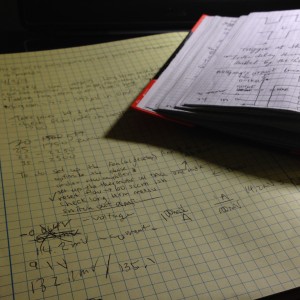
Whether you work in the sciences or humanities, it’s integral to keep track of your work. It sounds obvious – it did to me too – until I started flipping through some of my notes in my lab notebook, trying to figure out the tests and results for a few small tests last semester. I knew I had done the tests, but I just couldn’t figure out what exactly I had done. Eventually, I found a few numbers in my notebook but couldn’t decipher them. Maybe those notes made sense to me 5 months ago, but now they only look like random scrawls of numbers to me.
It isn’t always a lab notebook: it could be keeping track of papers you’ve read and researched, writing down ideas you’ve tossed around with classmates or your adviser, basically keeping a record of all the work you’ve done. Often it can get boring to record every little thing, and often it can feel unnecessary, but not keeping a detailed record or at least well-organized notes or data of your progress somewhere helps no one. It does your hard work no justice when you can’t look back on it in the future and save time by skipping what you’ve already done. It all saves you time in the future from looking at the same papers, doing the same tests.
In my case, I thought that chugging through different permutations of parameters to try for an experiment wasn’t worth writing down unless I got some interesting results. Besides, changing these parameters seemed very obvious to me at the time. Of course I would remember what stood out, I told myself. I’ll just make a mental note. I thought it would simply be extraneous to write down in extra detail what I was doing – so in the end, I merely wrote down the bare minimum. Just imagine my confusion going through my old scrawls and numbers again!
Thankfully, my adviser asked me to prepare weekly graphs for my meetings with him. Otherwise, some of my notes would probably have never seen the light of day. Having to make graphs and summarize my notes every week at least forced me to keep track of some of the tests I was doing, no matter how pointless they seemed. I realized that if you can enforce a system (or if you can work with your adviser to create one) in which you review your progress every week, it works wonders in the long run. Make sure you can understand everything you’ve made notes on before too much time has passed and you’ve already forgotten everything!
After all, research is a journey into the unknown, an adventure into realms of unexplored knowledge. So writing down everything along that journey, no matter how pointless or dull, will be worth it in times that you get lost, or when you do find something exciting. Either way, you’ll be able to trace your steps right along that journey.
— Stacey Huang, Engineering Correspondent

